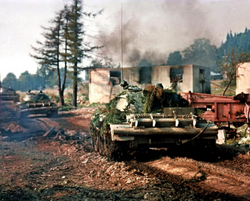Liothidian military intervention in Ommenlanden
This article is incomplete because it is pending further input from participants, or it is a work-in-progress by one author. Please comment on this article's talk page to share your input, comments and questions. Note: To contribute to this article, you may need to seek help from the author(s) of this page. |
| Operation Fraternity Operation Brüderlichkeit | |||||||
|---|---|---|---|---|---|---|---|
 Liothidian tanks advancing toward Alkmaar on 29 May 1994. | |||||||
| |||||||
| Belligerents | |||||||
|
|
| ||||||
| Commanders and leaders | |||||||
|
|
| ||||||
| Strength | |||||||
|
|
| ||||||
| Casualties and losses | |||||||
|
55 injured 29 injured |
2,084 injured or captured | ||||||
| 89 civilians killed or injured | |||||||
The Liothidian military intervention in Ommenlanden, officially known in Liothidia as Operation Fraternity (Liothidian:Operation Brüderlichkeit), was a week-long military operation, between May and June 1994, against the Ommish government under Johannes Alders.
The operation came at the climax of the Lost Decade, which was a continious economic and political crisis that emerged following the death of long-time leader, Karsten Kroon. The operation involved a significant portion of the Ommish military and 36,000 Liothidian soldiers. The relatively bloodless invasion ended with the storming of the government district in Alkmaar and the mass purge of the Ommish communist government.
The Liothidian military began an occupation of Ommenlanden while appointing new leaders, who in turn, launched Liothidian inspired reforms of the political, economic and social systems of the country. The invasion preserved Liothidia's influence over the country and the location of Ommenlanden within its sphere of influence, while bringing political and economic stability, it remains one of the most hotly debated military actions of the late 20th century.
Over 500 pro-Alders soldiers and police were killed, alongside 89 civilians who died in fighting or accidents.